Period 3 Grammar 课件
合集下载
2022八年级英语上册Unit3Adayout课时3Grammar课件新版牛津版
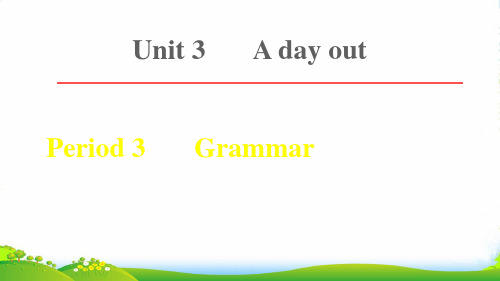
himself. 我表弟足够大可以自己穿衣服了。
语法讲解
考向3 (重点)反身代词作主语或宾语的同位语,起强调 作用。 e.g. We’d better go to see the house ourselves. 我们最好亲自去看房子。
语法讲解
中考在线3:Something is wrong with my father’s new computer. It always turns _i_ts_e_lf_____ (it) off. [淮安]
A. Using as ... as
TIP :not as ... as = not so ...
We use as ... as to say that people or things are the saasme in some ways.
Mr Wu is as happy as the two girls.
most luckily
He fell off his bike. Unluckily, he hurt his leg.
他从自行车上摔了下来。不幸的是,他伤了腿。
luckily 的反义词
语法讲解
as...as 的用法
考点 表示两个人或物在某些方面相同或不同,用“as + 形容词或副词原级+ as”或“not as+ 形容词或副词 原级+as”结构。
语法讲解
考向4 (易错) not as/so... as... 结构与比较级的 转换 e.g. This park isn’t as/so big as that one. = This park is smaller than that one. = That park is bigger than this one. 这个公园不如那个大。 Jim doesn’t speak English as well as Mary. = Jim speaks English worse than Mary.
语法讲解
考向3 (重点)反身代词作主语或宾语的同位语,起强调 作用。 e.g. We’d better go to see the house ourselves. 我们最好亲自去看房子。
语法讲解
中考在线3:Something is wrong with my father’s new computer. It always turns _i_ts_e_lf_____ (it) off. [淮安]
A. Using as ... as
TIP :not as ... as = not so ...
We use as ... as to say that people or things are the saasme in some ways.
Mr Wu is as happy as the two girls.
most luckily
He fell off his bike. Unluckily, he hurt his leg.
他从自行车上摔了下来。不幸的是,他伤了腿。
luckily 的反义词
语法讲解
as...as 的用法
考点 表示两个人或物在某些方面相同或不同,用“as + 形容词或副词原级+ as”或“not as+ 形容词或副词 原级+as”结构。
语法讲解
考向4 (易错) not as/so... as... 结构与比较级的 转换 e.g. This park isn’t as/so big as that one. = This park is smaller than that one. = That park is bigger than this one. 这个公园不如那个大。 Jim doesn’t speak English as well as Mary. = Jim speaks English worse than Mary.
Unit 6 My clothes, my style Period 3 课件 译林版七年级上册

11
Asking questions Read the conversations below. Pay attention to the three question types. Daniel: Do you have a talk with Ms Li before the show? ① Kitty:Yes.It's about colours in fashion. 温馨提示:此符号表示
11
3. __W__h_e_r_e__ is Sandy? She's at her desk.
4. __W__h_i_c_h__ painting do you like best? I like this one best.
5. __W__h_y____ do y ou like painting? Because it's lots of fun.
词(do/ does)提前,动词用原形。肯定 回 答 为 Yes , ...do/ does ; 否 定 回 答 为 No,...don’t/doesn’t.
11
You like apples. → Do you like apples? He runs fast. → Does he run fast?
a. Because I think you look smart /smɑːt/ in the jeans. b. Could you give me some advice? c. Do the grey trousers go with it? d. Which one do you like better, the red one or the orange one? e. Whose birthday party is it, by the way?
Asking questions Read the conversations below. Pay attention to the three question types. Daniel: Do you have a talk with Ms Li before the show? ① Kitty:Yes.It's about colours in fashion. 温馨提示:此符号表示
11
3. __W__h_e_r_e__ is Sandy? She's at her desk.
4. __W__h_i_c_h__ painting do you like best? I like this one best.
5. __W__h_y____ do y ou like painting? Because it's lots of fun.
词(do/ does)提前,动词用原形。肯定 回 答 为 Yes , ...do/ does ; 否 定 回 答 为 No,...don’t/doesn’t.
11
You like apples. → Do you like apples? He runs fast. → Does he run fast?
a. Because I think you look smart /smɑːt/ in the jeans. b. Could you give me some advice? c. Do the grey trousers go with it? d. Which one do you like better, the red one or the orange one? e. Whose birthday party is it, by the way?
Module 2 No Drugs Period 3 Grammar 课件(外研版必修2)

知识储备
注意
不定式还可以作结果或原因状语:
(1)表结果 The hall is large enough to hold two hundred people.
本 课 栏 目 开 关
这个大厅非常大,足够容纳 200 人。 He grew up to be a great musician. 他长大后成了一名伟大的音乐家。 (2)表原因 You must be very happy to have found your lost car. 你的车失而复得,一定非常高兴。
知识储备
对于不定式作目的状语,应注意以下几点: 1.不定式短语的否定形式应该在不定式符号 to 前面加 not。 Let’s hurry so as not to be late for school.
本 课 栏 目 开 关
快点以便上课不会迟到。 2.in order to 引导的目的状语,可以放在句首,也可以放在 句末;但 so as to 引导的目的状语,只能置于句末,而不能置于句 首。 They started early in order to get there in time.(正) 他们早些出发是为了及时到达那里。 In order to get there in time,they started early.(正) 为了及时到达那里,他们出发得很早。
so as to by cannabis.
4.I refused to take the drug so as not to become addicted. 5. I took the doctor’s advice in order not to continue taking drugs.
语法感知
语法感知
Period three Grammar 定语从句(关系副词)

• (2)where • This is the place where I was born. (=in which) • This is the place (which/that) I visited. • (3)why • That’s the reason why/ for which he was late. • The reason (which/ that) he provided was believable.
• why(先行词为reason(固定)) Book P91
注意: 1.关系副词=“介词+which”
• • • • • (Eg:Book P91) when(相当于at, in, on, during 等介词+which) where(相当于at, in 等介词+ which) why (相当于for which(固定)) 介词由先行词的习惯搭配 看例子
另:介词+关系代词(学案P97) • The person to whom you just talked is Mr. Li. 介词有先行词的习惯性搭配或后半句动词的搭配而决定。
注意2.区别
• (1)when • Eg: I will never forget the time when we studied together.(=during which) • I will never forget the time (that/which) we spent together.
注意3.先行词为way时的定语从句
This is the way (that/in which) I do such things. We first broke the law in a way which/ that was peaceful.
Module 4 Fine Arts—Western,Chinese and Pop Arts Period 3 Grammar 课件(外研版必修2)

going (go) to art galleries.பைடு நூலகம்
语法感知
Period Three
b.动名词作主语
本 课 栏 目 开 关
1. Painting (paint) is difficult for me. 2.I think drawing (draw) is a lot easier. 3.Learning(learn) to paint well takes a long time.
to give
(practise) practising (speak)
知识储备
Period Three
动词不定式和动名词作宾语&动名词作主语 一、动词不定式和动名词作宾语
本 课 栏 目 开 关
动词不定式和动名词句法功能比较一览表 功能 主语 不定式 动名词 √ √ 表语 √ √ 宾语 定语 状语 √ √ √ √ √ ×
助记 三个希望两答应,两个要求莫拒绝; 设法学会做决定,不要假装在选择。
知识储备
Period Three
3.有些动词既跟 v.ing 形式又跟动词不定式作宾语,意 思几乎是一样的,没什么差别。 begin,start,continue 等词后,既可以跟不定式,又可以 本 课 栏 跟动名词作宾语。但其后如是 see,understand,realize 等时, 目 开 一般用不定式。 关 He continued to borrow/borrowing money from his boss. 他接二连三地向老板借钱。
语法感知
Period Three
Ⅱ.用所给单词的适当形式填空 1.He failed to pass (pass) the driving test. 2.I can’t afford
牛津版八年级英语上册Unit8 Period3 Grammar课件
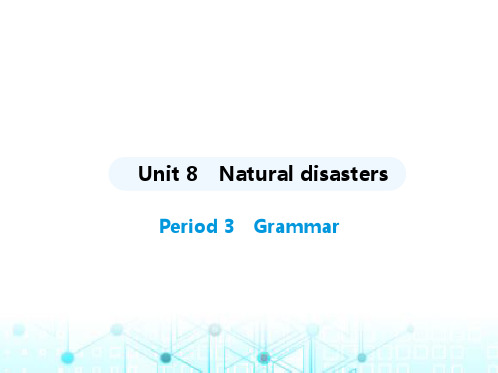
D.will jog
解析 由语境及when...back可知,当暴风雨来临时,我们正在 慢跑,用过去进行时。故选B。
15.(2023江苏镇江中考)—Peter, what were you doing at this
time last night?
—I B chess with my grandfather.
A.play
B.was playing
C.am playing
D.played
解析 根据问句可知,此处指过去的某一时刻正在做的事情, 应用过去进行时。故选B。
Ⅲ.根据汉语意思(及提示词)完成句子 16.(2023湖北随州中考)暴风雨来临的时候,你正在做什么? What were you doing when the rainstorm came? 17.(2023湖北荆州中考)登山者们正在尽最大努力登顶,这时 开始下大雪了。(best) The climbers were doing/trying their best to reach the top when it began to snow heavily.
18.(2023湖北黄冈中考)昨天这个时候学生们正在谈论机器 人。(talk) Students were talking about the robots at this time yesterday.
4. Was he watching (watch) videos while his mother was cooking? 5.While we were waiting (wait) for the bus, a girl ran (run) u p to us. 6.As I was walking (walk) in the park, it began (begin) to rain. 7.I was having (have) my breakfast at half past six yesterday morning.
人教版(2024)七年级英语上册 Unit 2 Period 3 Grammar (3a-3d)

Does your father spend a lot of time fishing?
Yes, he does. /No, he doesn’t.
Does your mother have a piano? It’s my mother’s.
3b Complete the sentences with the correct possessive form ('s) of the words in brackets. 1. This is __K_a_t_e_’s_____(Kate) cat. It likes fish very much. 2. This is _P_e_t_e_r_a_n__d_E__m_m__a_’_s_ (Peter and Emma) classroom. They love their big and clean classroom. 3. These are my little _b__ro__th_e__rs__’ ___ (brothers) balls. They play with them in the playground every day.
3d Ask and answer questions about each other’s family.
·Do you have any sisters or brothers? ·Does your father play any sport? ·Does your mother like music? ·...
They have some nice ping-pong bats.
Do you play the piano?
Teng Fei’i’s father has a fishing rod.
必修五Unit3 period3 Grammar过去分词作状语
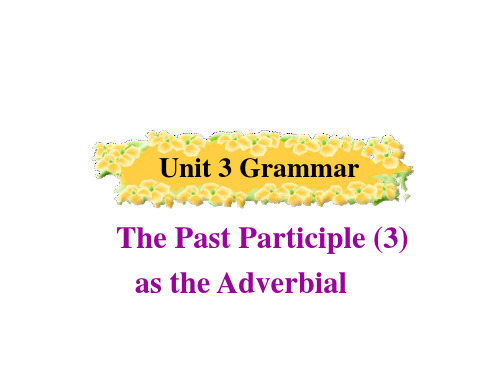
过去分词作状语, 表示被动的动作或动作 已经完成。过去分词(短语)通常可作:
1. 时间状语 时间状语可在过去分词前加上连词when, while, until等。 When it is seen from the hill, the park looks very beautiful.
Seen from the hill…
5. If I am compared with you, we still have a long way to go. Compared with you, we still have a long way to go.
6 The hunter left his house, and he was followed by his dog.
The hunter left his house, followed by his dog.
Rewrite with proper conjunctions
Example:
1. United we stand, divided we fail. If we are united, we will stand, but if we are divided, we will fail.
Unit 3 Grammar
The Past Participle (3) as the Adverbial
在前两个单元我们讲解了动 词的-ed形式作什么呢?
作定语和表语 作宾语补足语来自本单元我们将继续学习动词 的-ed形式作句子中的另一种 成分。 动词的-ed形式作状语
观察下列句子:
Once published, his works (=Once his works was published, ) became famous for the absence of rhyme at the end of each line. PP作时间状语, 相当于一个时间状语 从句。有时过去分词前可加连词when 或while来强调时间概念。
Natural disasters Period 3 Grammar课件

23002
过去进行时
我们可以用过去进行时表示过去某一时刻正在进行 的动作或过去某一阶段一直在进行的动作。如: I was doing my homework at 8 p.m. last night. 昨晚8点我正在做家庭作业。 What were you doing last month? 你上个月一直在做什么?
Simon: I _w_a_s__h_av_i_n_g__ (have) breakfast. Mr Wu: What about you, Millie?
23002
Millie: I __w_a_s_w__a_lk_i_n_g_ (walk) to the bus stop. Sandy, I saw you and your parents standing on the side of the road. _W__e_re_ you _w__a_it_in_g_ (wait) for a taxi?
Language Points
1. My dad's car broke down because of the cold weather. break down (车辆或机器)出故障,坏掉 e.g. The car broke down on the way to the airport. 车子在去机场的路上出故障了。 because of 因为;由于 e.g. Because of you, we have to put the meeting off. 因为你的缘故,我们已把会议推迟了。
23002
1. We use “was + doing” with the pronoun __h_e__, _s_h_e__, ___it__ and __I___. We use “were + doing” with the pronoun _y_o_u__, _t_h_e_y_ and __w_e__.
A day out Period 3课件(共24张PPT)牛津译林版八年级上册
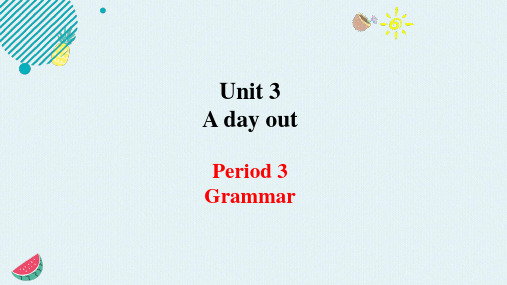
23002
Reflexive pronouns
Singular myself yourself himself herself itself
Plural ourselves yourselves
themselves
1. 单数的反身代词以self结尾,复数的反身代词以selves结尾; 2. 第一人称和第二人称的反身代词是由形容词性物主代词加
anything exciting. 5. None of the _c_li_m__b_er_s_ (climb)stopped halfway. They kept trying.
23002
二、根据汉语意思完成下列句子。
1. 我怎样才能说英语说的跟你一样好? How can I speak English___a_s___ __w__el_l__ ___a_s___ ___y_o_u__, Rose? 2. 看!吉姆正在尽力地向树上爬去。 Look!Jim is__tr_y_in_g__ ___t_o___ __c_li_m_b__ ___u_p___the tree. 3. 请不要告诉其他任何一个人有关这个消息的情况。 Please don't___te_l_l ___ __a_n_y_o_n_e_ ___e_l_s_e__ ___ab_o_u_t__this information. 4. 我们必须保守我们自己的秘密。 We must__k_e_e_p__ ___th_e___ _s_e_c_r_e_t _ ___t_o___o_u_r_s_e_lv_e_s. 5. 现在很少有学生能自学英语。 Now few students can __l_e_a_rn___English by_th_e_m__se_l_v_e_s.
unit6electricityperiod3grammar

不, 我们不可以走。
Must I finish reading the book this week?
Yes, you must.
No, you needn’t.
Activity Choose the correct answers.
( C ) 1. Everyone ________ go through the security check(安检)
➢ He can’t skate.
他不会滑冰。
➢ We can’t sing English songs. 我们不会唱英文歌。
Activity Let’s play a game!
The first student say : “I can … Can you do that?” Then, the next student answer : “Yes, I can./No, I can.t” And ask the third student “I can … Can you do that?” In this model, every student play this game in turn.
是本身有一定的词义,表示语气的单词。但是不能独立作谓语, 只能和动词原形一起构成谓语。情态动词用在行为动词前,表示 说话人对这一动作或状态的看法或主观设想。 情态动词虽然数量 不多,但用途广泛,主要有下列: can (could), may (might), must, need, ought to, dare (dared), shall (should), will (would)
Grammar Modal verbs: may and may not
may 和 may not的用法
沪教版英语九年级下册 Unit 5 Sport Period 3 Grammar 课件
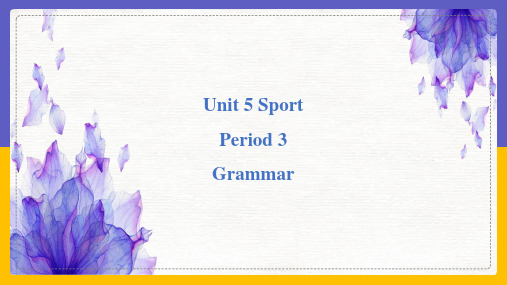
Tenses
Active voice
Passive voice
They will play the basketball match next week. Simple Future They are going to play the basketball match on Sunday morning.
当我回家时妈妈已经做好了饭。
Presentation Review of the passive voice
We have learnt the passive voice in different tenses.
Tenses
Active voice
Passive voice
Simple They play a basketball match A basketball match is
我将来会成为一名伟大的老师。 5. __T_o_m__c_a_u_g_h_t_a__c_o_ld__la_s_t_n_i_g_h_t,_s_o__h_e_c_a_n_'t__co_m__e_.______________
Tom昨晚感冒了所以他不能来。 6. __W__h_e_n__I _ca_m__e__h_o_m_e_,_m__y_m__o_t_h_e_r_h_a_d__co_o__ke_d__t_h_e_m__e_a_l.________
We have learnt the following tenses:
Tenses
Examples
Simple present
I/You/We/They swim every day. He/She/It swims every day.
Present
Present continuous
Unit 7 Be wise with money Period 3 Grammar课件 译林版七年
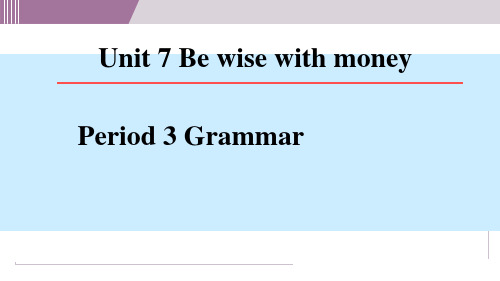
11
Sometimes we go there after school. (4) _T_h_e_r_e_a_r_e_ music boxes and some other nice things too. We can buy them as /æ z/ presents /'preznts/ for our friends. ③ Not far away /ə'weɪ/ from my school, (5) __t_h_e_re__is__ also a supermarket. ④ It is not very big, but (6) _t_h_e_r_e_a_r_e_ all kinds of snacks in it.
from work late as usual. 第二天晚上,楼上的
那个人像平常一样很晚下班回家。
11
构词法记单词:
classroom 教室
newspaper 报纸
weekday 周工作日 weekend 周末
football 足球
afternoon 下午
outside 在……外面 inside 在……里面
11
B2 Talk with your partner about things in shops or supermarkets around your home or school, using there be, some and any.
11
1 Do you have (6)________ ideas for the rest of your money?
Unit 7 Be wise with money Period 3 Grammar
11
通过本课的学习,学生能够: 1. 在听、说、读、写的活动中,学会运用some、any 和
Sometimes we go there after school. (4) _T_h_e_r_e_a_r_e_ music boxes and some other nice things too. We can buy them as /æ z/ presents /'preznts/ for our friends. ③ Not far away /ə'weɪ/ from my school, (5) __t_h_e_re__is__ also a supermarket. ④ It is not very big, but (6) _t_h_e_r_e_a_r_e_ all kinds of snacks in it.
from work late as usual. 第二天晚上,楼上的
那个人像平常一样很晚下班回家。
11
构词法记单词:
classroom 教室
newspaper 报纸
weekday 周工作日 weekend 周末
football 足球
afternoon 下午
outside 在……外面 inside 在……里面
11
B2 Talk with your partner about things in shops or supermarkets around your home or school, using there be, some and any.
11
1 Do you have (6)________ ideas for the rest of your money?
Unit 7 Be wise with money Period 3 Grammar
11
通过本课的学习,学生能够: 1. 在听、说、读、写的活动中,学会运用some、any 和
人教七年级英语上册 Unit 1 You and Me Period 3 (3a-3d)(课件)

我们、你们和他们来自中国。我们都是中国人。
速记小法: 人称代词用法: 人称代词主宾格,作用不同莫用错。 主格动词前作主,动词介词后宾格。 you 和it 主宾同,其他主宾须分清。 人称代词并列现,考虑顺序莫怠慢; 单数人称二三一,复数人称一二三。
返回
拓展:对应的形容词性物主代词
I—my(我的) you—your(你/ 你们的) she—her(她的) they—their(他/ 她/ 它们的)
Are Meimei and Peter in the same / seɪm/ class? Where is Mr Smith from? What class are you in?
Yes, I am. / No, I’m not.
Yes, they are. / No, they aren’t. He’s from the US. I’m in Class 1, Grade 7.
A. He
B. She
C. His
D. It
考题3:Nancy and Kate are good friends. __C____ are both
from England.
A. We
B. You
C. They
D. He
返回
2 You, he and I are friends.我、你和他是朋友。 3 We, you and they are from China. We are all Chinese.
一般现在时中be 动词的用法
be 动词 的形式
be 动词的一般现在时形式有三种:am,is,are。 用来表示人或事物的性质、状态等,说明主语
“是什么”或“怎么样”。
用法
am:主语是第一人称单数(I) 时使用,I 和am可 缩写成I’m(在一般疑问句的简略肯定回答中,I am 不能缩写。) 。①
速记小法: 人称代词用法: 人称代词主宾格,作用不同莫用错。 主格动词前作主,动词介词后宾格。 you 和it 主宾同,其他主宾须分清。 人称代词并列现,考虑顺序莫怠慢; 单数人称二三一,复数人称一二三。
返回
拓展:对应的形容词性物主代词
I—my(我的) you—your(你/ 你们的) she—her(她的) they—their(他/ 她/ 它们的)
Are Meimei and Peter in the same / seɪm/ class? Where is Mr Smith from? What class are you in?
Yes, I am. / No, I’m not.
Yes, they are. / No, they aren’t. He’s from the US. I’m in Class 1, Grade 7.
A. He
B. She
C. His
D. It
考题3:Nancy and Kate are good friends. __C____ are both
from England.
A. We
B. You
C. They
D. He
返回
2 You, he and I are friends.我、你和他是朋友。 3 We, you and they are from China. We are all Chinese.
一般现在时中be 动词的用法
be 动词 的形式
be 动词的一般现在时形式有三种:am,is,are。 用来表示人或事物的性质、状态等,说明主语
“是什么”或“怎么样”。
用法
am:主语是第一人称单数(I) 时使用,I 和am可 缩写成I’m(在一般疑问句的简略肯定回答中,I am 不能缩写。) 。①
牛津深圳初中英语七下《Module2 Unit 3 Our animal friends.》PPT课件period3-grammar

— Thanks.【2014龙岩】
A. you
B. your C. yourselves
3.My sister is old enough to dress ______ now.
【2014长沙】
A. himself B. herself C. myself
中考链接
4.Don’t worry. We’re old enough to look after ______.【2014陕西】
itself
himself
yourself
B Prepositions of position
Where is the mouse? It is in a bowl. It is on a shelf. It is next to/beside an apple. It is under a basket.
England.【2014天津】
A. between
B. with C. in D. under
The end
the bookshelves.
中考链接
1.The little kid is just two years old. He's too
young to take care of________.【2014贵阳】
A. his
B. him C. himself
2.— Help ______ to some fish, kids.
pot obf ephlaint _____the box. My bed is on the
otherdside of the desk. There are somabeopviectures _______the bed. My cat, Gigi, luiknedser sleeping______the boend. I have a newbetween carpet_______the floor ________my bed and
A. you
B. your C. yourselves
3.My sister is old enough to dress ______ now.
【2014长沙】
A. himself B. herself C. myself
中考链接
4.Don’t worry. We’re old enough to look after ______.【2014陕西】
itself
himself
yourself
B Prepositions of position
Where is the mouse? It is in a bowl. It is on a shelf. It is next to/beside an apple. It is under a basket.
England.【2014天津】
A. between
B. with C. in D. under
The end
the bookshelves.
中考链接
1.The little kid is just two years old. He's too
young to take care of________.【2014贵阳】
A. his
B. him C. himself
2.— Help ______ to some fish, kids.
pot obf ephlaint _____the box. My bed is on the
otherdside of the desk. There are somabeopviectures _______the bed. My cat, Gigi, luiknedser sleeping______the boend. I have a newbetween carpet_______the floor ________my bed and
相关主题
- 1、下载文档前请自行甄别文档内容的完整性,平台不提供额外的编辑、内容补充、找答案等附加服务。
- 2、"仅部分预览"的文档,不可在线预览部分如存在完整性等问题,可反馈申请退款(可完整预览的文档不适用该条件!)。
- 3、如文档侵犯您的权益,请联系客服反馈,我们会尽快为您处理(人工客服工作时间:9:00-18:30)。
Unit5 First Aid
Grammar
新课导入省略的目的,让学生自己去发现省略 的句子成分,然后后逐步讲解每一种省略的用法。 本课主要涉及到了三大类型的省略句型,即简 单句,并列句复合句。简单句的省略,主要是用在 情景对话里面,也是最简单的一种,没有作太多的 扩展。并列句是最好辨别的,主要省略前后句中的 相同成分。 本课件对复合句和其他特殊情况的省略 也作了详细的阐述,特别是that在多个宾语从句中 的省略和不定式to的省略,这些都是高考中的热点 和重点。最后部分顺便把英语里的替代部分 拿过来 和前面的省略作对比。Discussion 和rewrite又进一 步的加强了学生对省略的理解和运用。
1.省略主语:祈使句中的主语通常被省略;其他 省略的主语的情况多限于少数现成的说法.
(1) (You) Come in, please.
(2) (I) See you tomorrow. (3) (I) Thank you for your help.
(4) (I) Beg your pardon.
(5) 主语从句中有动词do,后面作表语的不定式的 to可带可 不带。 What we can do now is (to) wait. (6) find 当“发现”讲时,后面作宾语补足语的不定式符号to 可带可不带。 We found him (to) work very hard at the experiment.
1. Jack loves nature more than his wife.
Jack loves nature more than he loves his wife.
Jack loves nature more than his wife loves nature.
2. John understood himself better than Peter.
2.省略主语或谓语的一部分
(1) (There is) No smoking. (2) (Will you) Have a smoke?
(3) Why (do you) not say hello to him?
(4) How (do you think) about a cup of tea? (5) (You come) this way, please.
并列句中的省略
两个并列分句中,后一分句常省略与前一分句 中相同的部分.
(1) My father is a doctor and my mother (is) a nurse.
(2) I study at college and my sister (studies) at high school (3) Lin’s father was not at home, but his mother was (at home).
Ellipsis (省略)
为了使语言简洁或避免重复,省略句 中的一个或几个句子成分,这种语法 现象称为省略。
Examples Serves you right. Anything the matter? Are you ready? Yes, I am. We have to analyze and solve problems.
3.省略宾语:可省略宾语的全部;可省略作宾 语的动词不定式,只保留to,但如果该宾语是动 词be或完成时态,则须在to后加上be或have.
(1) ---Do you know Miss Hu? ---I don’t know (her). (2) Don’t touch anything unless the teacher tells you to (touch). (3) ---Are you a teacher? ---No, but I want to be (a teacher). (4) ---He hasn’t finished the task. ---Well, he ought to have (finish it).
I will help (to) do it for you.
I will help you (to) do it.
(3)介词but前若有动词do,后面的不定式不带 to.
The boy did nothing but play.
(4) 某些使役动词(let, make, have)及感官动词(see, watch, hear, notice, observe, feel, look at, listen to 等)后面作宾语 补足语的不定式一定要省去 to, 但在被动语态中须将to 复 原。 I saw the boy fall from the tree. The boy was seen to fall from the tree. The boss made us work 12 hours a day. We were made to work 12 hours a day.
John understood himself better than Peter understood John.
John understood himself better than Peter understood himself.
3. Max phoned his mother and Oscar did too.
night. (2) As (he was) a child, he lived in India. (3) If (you are) asked you may come in. (4) If (it is) necessary I’ll explain to you again.
(5) Though (he is) young, he knows a lot.
但如果是不定式 to be,则不能省略。
She found him to be dishonest.
4.连词if在部分虚拟条件句中可省略,但要将后 面的should,were,had提到主语的前面. (1) Had they time, they would certainly come and help us. (2) Were I you, I would do the work better.
(6) He opened his lips as if (he were) to say something.
3.不定式符号to的省略
(1)并列的不定式可省去后面的 to. I told him to sit down and wait for a moment.
(2) help 当“帮助”讲时,后面的宾语或宾补的不定式符 号to可带可不带.
省略部分
主语It
谓语 is
表语 ready 宾语problems 定语 of the money 状语 even
He spent part of the money, and the rest he saved.
The wisest man cannot know everything.
简单句中的省略
(3)Should there be a flood, what should we do?
替代
(一)so和not作替代词,代替被省略的某个词(组)或句子, 一般同表示个人看法或想法的动词连用,作be afraid, believe,become,all,do,expect,fear,hope,Imagine, say, see, speak, suppose, think等的宾语。 Not代替否定的句子,还可放在perhaps,probably, absolutely等副词后 E.g.: She was not angry at first, but became so (=angry)after a while. —Is he the best student in the class ? —I think so(=He is the best student in the class). —I think not(=He is not the best student in the class).
The book (that) I borrowed yesterday was hers.
2.在某些状语从句中,当从句的主语与主句的主语 一致或者从句主语为it,且从句谓语部分有be动 词时,可省去“主语+be”部分
(1) When (he was) still a boy of 10, he had to work day and
Max phoned his mother and Oscar phoned Max’s mother too. Max phoned Max’s mother and Oscar phoned Oscar’s mother.
4. I relied on you more than Roger.
I relied on you more than Roger relied on you. I relied on you more than I relied on Roger.
3.主句与从句各有一些成分被省略
The sooner (you do it) , the better hat省略
(1)宾语从句中常省略that,但多个宾语从句并列时, 通常只省略第一个that He said (that) the text was very important and that we should learn it by heart. (2)在定语从句中that在作宾语时才能省略
3. Why don’t you get some knowledge of first aid? Why not get some knowledge of first aid? 4. If it is necessary, send me an email with the details. If necessary, send me an email with the details. 5. When he was asked why he was late for class, he remained silent. When asked why he was late for class, he remained silent.
Grammar
新课导入省略的目的,让学生自己去发现省略 的句子成分,然后后逐步讲解每一种省略的用法。 本课主要涉及到了三大类型的省略句型,即简 单句,并列句复合句。简单句的省略,主要是用在 情景对话里面,也是最简单的一种,没有作太多的 扩展。并列句是最好辨别的,主要省略前后句中的 相同成分。 本课件对复合句和其他特殊情况的省略 也作了详细的阐述,特别是that在多个宾语从句中 的省略和不定式to的省略,这些都是高考中的热点 和重点。最后部分顺便把英语里的替代部分 拿过来 和前面的省略作对比。Discussion 和rewrite又进一 步的加强了学生对省略的理解和运用。
1.省略主语:祈使句中的主语通常被省略;其他 省略的主语的情况多限于少数现成的说法.
(1) (You) Come in, please.
(2) (I) See you tomorrow. (3) (I) Thank you for your help.
(4) (I) Beg your pardon.
(5) 主语从句中有动词do,后面作表语的不定式的 to可带可 不带。 What we can do now is (to) wait. (6) find 当“发现”讲时,后面作宾语补足语的不定式符号to 可带可不带。 We found him (to) work very hard at the experiment.
1. Jack loves nature more than his wife.
Jack loves nature more than he loves his wife.
Jack loves nature more than his wife loves nature.
2. John understood himself better than Peter.
2.省略主语或谓语的一部分
(1) (There is) No smoking. (2) (Will you) Have a smoke?
(3) Why (do you) not say hello to him?
(4) How (do you think) about a cup of tea? (5) (You come) this way, please.
并列句中的省略
两个并列分句中,后一分句常省略与前一分句 中相同的部分.
(1) My father is a doctor and my mother (is) a nurse.
(2) I study at college and my sister (studies) at high school (3) Lin’s father was not at home, but his mother was (at home).
Ellipsis (省略)
为了使语言简洁或避免重复,省略句 中的一个或几个句子成分,这种语法 现象称为省略。
Examples Serves you right. Anything the matter? Are you ready? Yes, I am. We have to analyze and solve problems.
3.省略宾语:可省略宾语的全部;可省略作宾 语的动词不定式,只保留to,但如果该宾语是动 词be或完成时态,则须在to后加上be或have.
(1) ---Do you know Miss Hu? ---I don’t know (her). (2) Don’t touch anything unless the teacher tells you to (touch). (3) ---Are you a teacher? ---No, but I want to be (a teacher). (4) ---He hasn’t finished the task. ---Well, he ought to have (finish it).
I will help (to) do it for you.
I will help you (to) do it.
(3)介词but前若有动词do,后面的不定式不带 to.
The boy did nothing but play.
(4) 某些使役动词(let, make, have)及感官动词(see, watch, hear, notice, observe, feel, look at, listen to 等)后面作宾语 补足语的不定式一定要省去 to, 但在被动语态中须将to 复 原。 I saw the boy fall from the tree. The boy was seen to fall from the tree. The boss made us work 12 hours a day. We were made to work 12 hours a day.
John understood himself better than Peter understood John.
John understood himself better than Peter understood himself.
3. Max phoned his mother and Oscar did too.
night. (2) As (he was) a child, he lived in India. (3) If (you are) asked you may come in. (4) If (it is) necessary I’ll explain to you again.
(5) Though (he is) young, he knows a lot.
但如果是不定式 to be,则不能省略。
She found him to be dishonest.
4.连词if在部分虚拟条件句中可省略,但要将后 面的should,were,had提到主语的前面. (1) Had they time, they would certainly come and help us. (2) Were I you, I would do the work better.
(6) He opened his lips as if (he were) to say something.
3.不定式符号to的省略
(1)并列的不定式可省去后面的 to. I told him to sit down and wait for a moment.
(2) help 当“帮助”讲时,后面的宾语或宾补的不定式符 号to可带可不带.
省略部分
主语It
谓语 is
表语 ready 宾语problems 定语 of the money 状语 even
He spent part of the money, and the rest he saved.
The wisest man cannot know everything.
简单句中的省略
(3)Should there be a flood, what should we do?
替代
(一)so和not作替代词,代替被省略的某个词(组)或句子, 一般同表示个人看法或想法的动词连用,作be afraid, believe,become,all,do,expect,fear,hope,Imagine, say, see, speak, suppose, think等的宾语。 Not代替否定的句子,还可放在perhaps,probably, absolutely等副词后 E.g.: She was not angry at first, but became so (=angry)after a while. —Is he the best student in the class ? —I think so(=He is the best student in the class). —I think not(=He is not the best student in the class).
The book (that) I borrowed yesterday was hers.
2.在某些状语从句中,当从句的主语与主句的主语 一致或者从句主语为it,且从句谓语部分有be动 词时,可省去“主语+be”部分
(1) When (he was) still a boy of 10, he had to work day and
Max phoned his mother and Oscar phoned Max’s mother too. Max phoned Max’s mother and Oscar phoned Oscar’s mother.
4. I relied on you more than Roger.
I relied on you more than Roger relied on you. I relied on you more than I relied on Roger.
3.主句与从句各有一些成分被省略
The sooner (you do it) , the better hat省略
(1)宾语从句中常省略that,但多个宾语从句并列时, 通常只省略第一个that He said (that) the text was very important and that we should learn it by heart. (2)在定语从句中that在作宾语时才能省略
3. Why don’t you get some knowledge of first aid? Why not get some knowledge of first aid? 4. If it is necessary, send me an email with the details. If necessary, send me an email with the details. 5. When he was asked why he was late for class, he remained silent. When asked why he was late for class, he remained silent.
